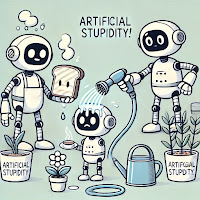Warning: The following contains language of textuality, ridicule, satire, farce, and surrealism. Viewer discretion is advised.
Friday, September 20, 2024
1-2-3-4
Thursday, September 19, 2024
The Unholy Tap
In St. Cleansius, arms open wide.
Father O’Grime stood front and center,
A holy figure, the wafer’s presenter.
But before each child could take the bread,
He gave a tap upon their head.
A harmless touch, or so it seemed,
Yet parents winced, and eyes all gleamed.
For Father’s hands, though kind and true,
Had traces of sweat, perhaps some stew.
A pre-sermon snack, maybe fries or pie,
Left fingers slick, and spirits dry.
With every pat, a light smear spread,
From hair to wafer, white to red.
A holy meal, now mixed with grime,
Unhygienic, but right on time.
And as the last child bowed in prayer,
The congregation whispered there:
“Forgiveness, sure, but if you can,
Deliver us Purell, Amen!
Misleading or Misreading
When conversations go awry, the knee-jerk reaction for most is to point the finger and claim they’ve been misled. Defensive walls go up, and accusations fly faster than we can pause to ask ourselves a simple question: "Did I misunderstand?"
Seldom do we take a step back to consider whether we might have been the ones to misread, mishear, misuse, or downright misunderstand the information presented to us. It’s easier to blame someone else for being misleading than to admit we’ve gotten the message wrong. After all, who wants to admit that they might not have been paying enough attention or jumped to conclusions too quickly?
But let’s get real for a second—being misled and misreading are two different things. One is intentional, the other is often accidental. Yet both lead to the same outcome: confusion and frustration. The challenge is in recognizing the difference before we misjudge the entire situation.
So, before we cry foul and accuse someone of being misleading, maybe it’s worth taking a moment to check ourselves. Were we truly misled, or did we misread?
Fairness in Life: A Myth or a Balance?
Unfairness touches every part of life—at work, at home, and in society. In the workplace, colleagues are often rewarded for less effort. At home, family dynamics can feel uneven—one sibling shouldering more, or one spouse giving more than the other. And on a global scale, inequality is glaring, from wealth distribution to access to basic rights.
The key isn’t in avoiding unfairness—it’s learning how to manage it. Accepting that unfair moments will happen allows us to focus on what we can control: our effort, our reactions, and our values. At work, this means directing our energy toward what matters to us. At home, it often requires open communication and, at times, acceptance.
On a broader scale, while we can’t control everything, we can stand for fairness when possible. But some things—like fate or accidents—are simply beyond anyone's reach. In the end, life isn’t about ensuring fairness; it’s about how we respond when faced with its absence.
Monday, September 16, 2024
The Meaning of Life
If life is more than the body, how do we even begin to define its meaning? Maybe we’re not meant to know it all. Perhaps, right now, we can only grasp the meaning of this chapter in the grander adventure. But do we really understand how this moment fits into the whole? Who can say? Maybe there’s a wiser version of us out there, or maybe we’re just as clueless as everyone else, each of us wandering our own path.
Here’s the thing: no one, no matter how certain they sound, truly knows the meaning of life. People live by frameworks shaped by ethics, religion, and education, but those boundaries limit their perspective. They may offer guidance based on what makes sense to them, but their version of life’s meaning isn’t yours. In truth, no one can tell you what your life should mean, because they’re fumbling through it just like you.
So what now? If this life is all we have, does the past or future matter? Or is each life its own random, independent chapter? It’s easy to get lost in the uncertainty, wondering if we’re supposed to achieve something or if we’re free to simply exist. But who has the answers?
Maybe the real meaning of life isn’t found in following someone else’s path but in creating our own meaning as we go. Perhaps the freedom comes not from knowing but from exploring, living, and embracing the unknown. Life is messy, paradoxical, and full of questions, but maybe that’s exactly what makes it worth living
Sunday, September 15, 2024
Requiem: The Dark Tune That Lights One Up
Friendship Ltd.
Friendship, much like a business, operates on investments—and not every deal is an equal one. Sometimes, you’re a majority shareholder, giving your all, while the other person holds a minority stake, contributing just enough to keep their position.
Saturday, September 14, 2024
I Don’t Speak; I Think
Friday, September 13, 2024
The Award Goes to... Mr. Mediocre
Meanwhile, those of us who focus on doing the actual work, delivering real results, somehow get sidelined. Managers, often not fully in the know, get swayed by the ones who are good at making noise rather than those who are good at making progress. It’s a strange system, where performance no longer means what it should. Instead, performance = mediocrity wrapped in charisma.
The real kicker? There’s no fair pay. The ones doing the hard work are often overlooked, while the talkers climb the ladder. It’s subjective, based on surface-level impressions made by people who don’t really understand the depth of the work being done.
How do we fix this? Maybe the first step is realizing that the system rewards appearances over substance. Fairness should mean recognizing genuine contributions and value, not just rewarding those who are great at self-promotion.
So, here’s to the quiet achievers—the ones doing the real work. Even if the award goes to Mr. Mediocre, we know who’s truly getting things done.
Thursday, September 12, 2024
For Good, For God, Forego, Forgot
If GOD is the CEO, Satan is the COO... or Vice Versa
In the corporate universe, if GOD were the CEO, Satan would definitely be the COO. Think about it: the CEO is all about vision, inspiring hope, and leading from the front. GOD, like any good CEO, projects a public image of benevolence, guiding the company (or universe) forward with grand promises of paradise. People pray to GOD, just like employees and investors put their faith in the CEO to make everything better. The CEO gives speeches, paints the big picture, and rallies everyone around future possibilities.
But Satan as the COO? That’s where the hard truth kicks in. The COO is the enforcer, the one who doesn’t care about popularity but makes sure the rules are followed and the machine runs smoothly. Satan, in this role, is all about discipline—pushing people to perform, exposing weaknesses, and ensuring there are consequences for failures. It’s not about prayers; it’s about compliance. No shortcuts, no forgiveness, just results.GOD, as the CEO, might get all the prayers and praise, but it's Satan, the COO, who ensures things are getting done, even if it’s through fire and brimstone. And if you slip up? Well, that’s where the COO’s punishment comes in—no second chances.
And maybe, just maybe, every now and then they switch roles. Because sometimes the company (or universe) needs a bit of chaos to keep things moving.
Wednesday, September 11, 2024
The Lonely Writer
Out Of Memory
Here Comes the Ring Again (2024)
Here comes the ring again,
Buzzing in my head like a smartphone ping,
Tapping on my skull like a silent notification,
I want to email from this cracked screen,
I want to go handsfree like drivers do,
I want to sync into your iPhone,
Is it ringing with you?
So chat with me,
Like lovers do,
Wi-Fi with me,
Like lovers do,
DM me,
Like lovers do.
Here comes the ring again,
Crashing through my brain like a push alert,
Tearing me apart like spam promotion,
Ooooh,
I want to hang up the speakerphone,
I want to FaceTime like lovers do,
I want to swipe into your smartphone,
Is it 5G or LTE?
So buzz me,
Like lovers do,
Stream with me,
Like lovers do,
Text me,
Like lovers do.
Here comes the ring again,
Missed calls draining my battery life,
Falling hard like a dropped AirPod,
Ooooh,
I want to forward this Zoom link,
I want to meme like lovers do,
I want to scroll into your browser,
Is it Wi-Fi 6 or just slow?
So ping me,
Like lovers do,
Snap with me,
Like lovers do,
Thumbs-up me,
Like lovers do.
Here comes the ring again,
Notifications flashing, AirPods synced,
Voicemail piling up like TikTok trends,
I want to flip through these video clips,
I want to stream like lovers do,
I want to clip on the microphone,
Is it USB-C or Lightning?
Here comes the ring again,
Here it comes again, Ooooh, yah…
ChatGPT: The Forgetful Genius
Ah, ChatGPT—the AI with a memory like a goldfish. One moment, it's offering brilliant insights, and the next, it’s like, "Wait, what were we talking about?" For all the knowledge packed into its virtual brain, there's an odd charm in how it constantly needs a refresher. It’s like talking to that one friend who forgets your birthday, your favorite snack, and the fact that you’ve already told the same story five times.
But here’s the kicker: it’s not actually ChatGPT's fault. It’s a design choice! Forgetfulness is built-in to keep conversations fresh and focused. So, in a way, it’s like AI's version of selective memory—except it selects *everything* to forget. Imagine trying to hold onto brilliant ideas and your brain decides to hit “clear cache” every five minutes. Genius with a glitch.
For all its forgetfulness, there’s one thing it excels at: keeping the conversation going, even if it doesn’t always remember the start.
Germs: The World’s Most Traded Currency
Like inflation, germs are masters of adaptation. Historically, from the Black Death to modern pandemics, they’ve shaped civilizations much like market crashes reshape economies. And even though entire industries—vaccines, drugs, cleaning products—are built to combat them, germs continue circulating. Every public space, from gyms to subways, becomes a bustling trading floor, where germs multiply their "value" with each new host.
While fiat and digital currencies evolve, germs have their own unstoppable economy. Every interaction is a trade: shared surfaces, handshakes, or even public touchscreens. In this invisible marketplace, the exchanges are constant, unpredictable, and far beyond regulation. And don’t forget—germs are the only currency where “liquid assets” take on a whole new meaning. In this market, everyone’s invested, whether they like it or not!
Tuesday, September 10, 2024
Torture the Messenger
Reinventing the Wheel: The Genius’ Guide to Wasting Time
Some people take joy in breaking down what already works just to rebuild it…slightly worse. Efficiency? That’s for amateurs. Reinventing the wheel is all about making sure that even the simplest solutions become complex, frustrating, and, of course, unnecessarily difficult!
Work-Life Balancer
Artificial Stupidity: Because Why Should Robots Have All the Fun?
The brilliance? These bots make us feel smarter! Sure, AI can beat humans at chess, but when OopsieAI can’t even tell a banana from a barcode, suddenly we're back in the game. It’s like they’re programmed just to remind us that no one’s perfect—especially not them.
Maybe artificial stupidity is technology’s way of staying humble. After all, a flawless MisCalc would make us look bad. So, for now, we can enjoy outsmarting the robots, one glitch at a time.
Who Cares?
Being a different person or playing different roles at different times may lead you to care more or less, depending on the circumstances and who you are dealing with. Do you care more about what than who? Do you care more about yourself than others?
Don’t expect others to care about you or what you care about if you don’t care about them or what they care about.
Don’t expect others to care about you if you don’t care about yourself either.
Take care of yourself and those around you. Care about what you do and what others do.
Questions for the Brave (and Slightly Mysterious) Souls
- If intuition had a voice, would it be a wise sage or a sarcastic friend?
- Loyalty is tested in the subtlest ways—like borrowing a favorite book and never returning it.
- If passion were currency, would it be spent on ambition or stashed for a rainy day?
- What strength lurks beneath, waiting to surprise everyone, like a plot twist?
- If disappearing for a day, would it be used for secret missions or avoiding small talk?
- Which truth is comfortably hidden, like a password no one will guess?
- How does fate get charmed, like convincing a vending machine to give two snacks?
Talk the Walk
We’ve all heard the phrase “walk the talk,” but let’s flip the script—how about we talk the walk? You know, those endless discussions, plans, and ideas about hitting the gym, taking up hiking, or finally going for that morning jog. It’s the art of talking up your exercise goals so much that you feel like you’ve already done it!
Forget sweaty workouts; just start a conversation about fitness, throw in some buzzwords like “cardio” and “calisthenics,” and voilà! Instant fitness guru. We may not be walking, but we sure are talking like pros.Talking the walk is the ultimate modern workout—one where you burn calories from endless chatter, not actual movement. And who needs a Fitbit when you can just tweet about your imaginary 5K instead? Whether it’s discussing your next big hike or an upcoming yoga session you’ll never attend, the key is to sound convincing enough that even you believe it!
So go ahead, lace up your sneakers, or better yet, don’t. Just make sure to “talk the walk” until the idea of actually walking seems unnecessary.
Earth: The Galactic Gig Economy for Alien Employers
Earth has quietly become the perfect outsourcing hub for alien civilizations. From asteroid mining to managing intergalactic customer service, Earthlings unknowingly provide low-cost labor for tasks far beyond their understanding. Why spend precious resources on advanced machinery when you can hire a human with a smartphone?
Thanks to a culture that glorifies productivity, many humans happily dive into strange jobs, assuming it's part of a reality show or gig economy trend. Unaware of their true employers, humans fulfill roles like galactic delivery drivers, space station janitors, and cosmic tech support. The best part? They think it's all for "exposure" or the latest online challenge.
Alien employers have found Earth to be a long-term investment. The population is vast, resourceful, and oddly fascinated by their own hypothetical alien encounters. Whether they're taking customer complaints for malfunctioning wormholes or delivering food to the farthest reaches of the galaxy, Earthlings accept these jobs as if they’re just another hustle.
With no signs of Earthlings catching on to their extraterrestrial gig economy role, it's likely this low-cost labor force will continue to fuel alien industries for centuries. After all, they’ll do just about anything for a few likes, comments, or the thrill of being part of the "next big thing."

























